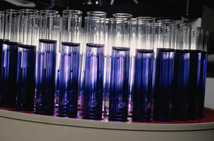
The purpose of the TheRAlead project is the development of new drugs to treat rheumatoid arthritis through a 'hit-to-lead' process that aims at the design, synthesis and evaluation of inhibitors for a number of pathogenic factors (such as Tumour Necrosis Factor [TNF] and RANKL cytokine) that are key molecules for the development of the illness. This is a collaborative project where participating agencies and enterprises utilise their scientific excellence, know-how and complementary specialisation in fields such as molecular genetics, illness modelling, organic chemistry, chemoinformatics, substance formulation and pre-clinical assessment.
To date, over 100 new compounds have been tested (of which seventy were synthesised within the framework of the project and over thirty are commercially available) with very encouraging results. The first patent application has already been submitted in regard to the most effective compounds, while, within the framework of the project, three papers have already been published on improvements to the methodologies used, as well as the development of new assessment tools (such as the RANKL animal model), with two more papers being prepared.
TheRAlead has developed a reliable process for discovering and assessing new drugs that has already made significant contributions to the generation of new knowledge and innovation. Its objectives and direct results are products of innovation, since the project proposes new small molecules that block the TNF and RANKL pathogenic factors, with significant prospects for the treatment of human illnesses such as arthritis, osteoporosis and other chronic autoimmune illnesses. TheRAlead has succeeded in bringing into contact scientists from various fields, from both the academic and the private sector, creating a team with complementary specialisation in the field of new drug development.
The synergies created within the framework of the project will continue beyond its time limits, as the associated agencies are already pursuing new opportunities for further developing the integrated platform they have established.
The platform consists of a series of new tools -such as improved models of human illnesses, cellular and in vitro trials, as well as a series of methodologies for the scanning of virtual libraries and computer optimisation of compounds- that have already contributed to the enhancement of the 'information society'. The platform also strengthens the competitiveness of participating agencies, the utilisation of the emerging new knowledge and innovation, and can serve as a model for similar actions with the participation of other agencies at local or national level.
Further information:┬Āhttp://bsrcfleming.wix.com/theralead
┬Ā
|
FROM┬ĀTARGET-MOLECULES TO GUIDE-MOLECULES: INNOVATIVE PHARMACEUTICAL SUBSTANCES
FOR┬ĀARTHRITIS
|
|
Intervention Sector:
|
Research & Technology
|
|
Region:
|
Attica
|
|
Operational Programme:
|
Competitiveness & Entrepreneurship
|
|
Action:
|
SYNERGASIA 2009
|
|
Fund:
|
European Regional Development Fund
|
|
Project Coordinator:
|
'Alexander Fleming' Biomedical Sciences Research Centre
|
|
Budget:
|
2,445,750 euro
|
|
Public Expenditure
|
1,878,750 euro
|
|
Implementation Agency:
|
Special Service for the Management & Implementation of Actions in the Sectors of Research, Technological Development and Innovation
|
┬Ā
┬Ā
┬Ā |


